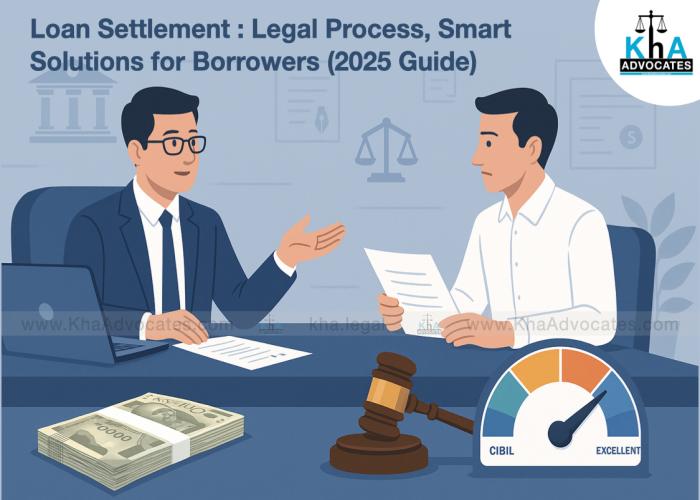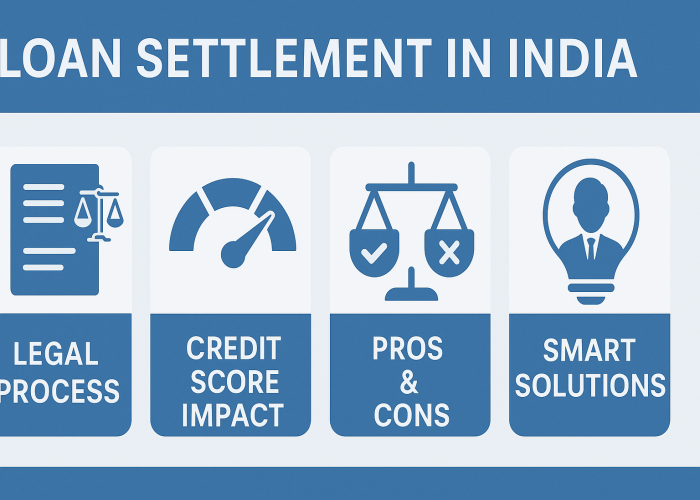
Published on: June 11, 2025
Facing trouble repaying a loan? You’re not alone. With rising interest rates, job uncertainties, and business disruptions, many individuals and entrepreneurs across India—including NRIs—are exploring loan settlement as a way out of financial stress. But settling a loan isn’t just a financial decision—it has serious legal, tax, and credit score implications.
In this guide, we’ll break down the legal process, real-life examples, common mistakes, and how KHA Advocates can help you settle your loans smartly, safely, and legally.
Loan settlement refers to negotiating with the lender to accept a lower amount than what is due as a full and final payment—typically after a borrower has defaulted and cannot repay in full.
📝 Example: If your outstanding loan is ₹8 lakhs and you negotiate a settlement at ₹5 lakhs, the bank may agree, mark your loan as “settled” in the credit bureau, and close the case.
⚠️ Important: Settlement is different from loan closure. Settlement negatively affects your CIBIL score and can restrict future borrowing.
Default Notice by the Lender
After 90 days of non-payment, your loan is classified as an NPA (Non-Performing Asset).
Bank sends a legal notice or demand notice.
Negotiation Phase
You or your lawyer negotiates a lump-sum or structured repayment with a waiver of interest or penalties.
Settlement Agreement
A written agreement (with legal terms) is signed between both parties.
Ideally vetted or drafted by a lawyer to protect you from future claims.
Loan Closure Letter & CIBIL Update
Bank issues a “No Dues Certificate”.
CIBIL report marks the account as “Settled” (not “Closed”), impacting credit score.
Mr. Roy, a startup founder in New Town, Kolkata, defaulted on a ₹12L business loan due to COVID-related losses. After months of harassment by collection agents, our team at KHA Advocates negotiated a settlement at ₹7.2L, with a written waiver of interest and legal claims. We also ensured that no criminal or civil case could be reopened post-settlement.
Impact of Loan Settlement on Credit Score
Your CIBIL/Experian score may drop by 75–100 points.
“Settled” status remains for 7 years on your credit history.
Future loan approvals (especially home or business loans) become harder.
💡 Tip: Get legal advice before signing a settlement offer. Many borrowers unintentionally admit liability that can backfire.
Pros | Cons | ||||||||
|---|---|---|---|---|---|---|---|---|---|
Quick debt relief | Damages credit score | ||||||||
May save on interest | Legal risks if poorly documented | ||||||||
Avoids long litigation | Reduces future loan eligibility | ||||||||
Psychological peace | Cannot reverse once signed |
Settling without a written agreement.
Accepting calls from unauthorized recovery agents.
Paying partial amounts without legal terms.
Ignoring credit score impact.
Failing to document No Dues Certificate.
Believing verbal promises from bank officials.
Settling without legal vetting—risking future litigation.
We offer full legal assistance in loan settlement across West Bengal, including Kolkata, New Town, Salt Lake, Baharampur, Hooghly, Alipore, Durgapur, Siliguri, and more.
Bank/Recovery Agent Negotiation
Drafting & Reviewing Settlement Agreements
Ensuring Legal Immunity Post-Settlement
Preventing Coercion or Harassment
Verifying CIBIL Record & Cleanup
Advising on Alternatives (Restructuring, OTS, SARFAESI)
Protecting Your Personal & Business Assets
✅ Check loan classification (NPA or not)
✅ Calculate total dues (principal + interest + penalties)
✅ Decide repayment capacity
✅ Consult legal advisor
✅ Negotiate with written documentation
✅ Avoid verbal assurances
✅ Ask for No Dues Certificate
✅ Monitor credit report
✅ Ensure tax compliance (loan waivers may be taxable)
Q1: Can a lawyer settle a loan on my behalf?
✅ Yes. A lawyer can formally represent you and negotiate better terms while protecting your legal rights.
Q2: Can banks take legal action after settlement?
❌ Not if the agreement is properly drafted and legally closed.
Q3: Is loan settlement available for home loans?
✅ Yes, but consequences on credit and future eligibility should be weighed carefully.
Q4: Will settlement affect my co-applicant or guarantor?
✅ Yes, they can also be impacted legally and financially unless specifically released in writing.
Q5: Can I remove “settled” status from my CIBIL report?
⚠️ It stays for 7 years. In some cases, our firm can help file corrections or restructure repayment terms to upgrade status.
8+ Years of Legal Expertise
Fast & Ethical Debt Negotiation
Real-Time Legal Shield from Harassment
100% Confidential Consultation
Custom Strategy for NRIs & Businesses
Proven Track Record Across Banks & NBFCs
Affordable, Transparent Fees
PAN India & Bengal-Focused Support
Get expert legal help from KHA Advocates to settle your loan safely, smartly, and legally.
👉 Book a FREE Consultation Now | 📧 contact@khaadvocates.in | 📍 Serving Pan India.

